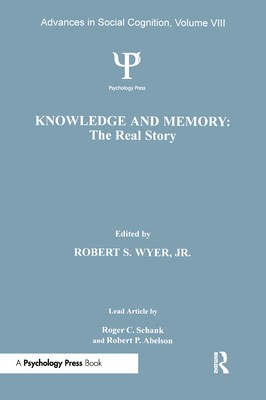
- We will send in 10–14 business days.
- Publisher: Psychology Press
- ISBN-10: 0805814469
- ISBN-13: 9780805814460
- Format: 15.4 x 22.9 x 1.8 cm, softcover
- Language: English
- SAVE -10% with code: EXTRA
Knowledge and Memory: The Real Story (e-book) (used book) | bookbook.eu
Reviews
Description
Narrative forms of mental representation and their influence on comprehension, communication and judgment, have rapidly become one of the main foci of research and theory in not only psychology but also other disciplines, including linguistics, sociology, and anthropology. No one has been more responsible for the awakening of interest in this area than Roger Schank and Bob Abelson. In their target article, they argue that narrative forms of mental representation, or "stories," are the basic ingredients of social knowledge that play a fundamental role in the comprehension of information conveyed in a social context, the storage of this information in memory, and the later communication of it to others. After explicating the cognitive processes that underlie the construction of narratives and their use in comprehension, memory and communication, the chapter authors consider the influence of stories on a number of more specific phenomena, including political judgment, marital relations and memory distortions that underlie errors in eyewitness testimony.
The provocativeness of the target chapter is matched by that of the companion articles, each of which not only provides an important commentary on Schank and Abelson's conceptualization, but also makes an important contribution to knowledge in its own right. The diversity of perspectives reflected in these articles, whose authors include researchers in linguistics, memory and comprehension, social inference, cognitive development, social judgment, close relationships, and social ecology, testifies to the breadth of theoretical and empirical issues to which the target chapter is potentially relevant. This volume is a timely and important contribution to research and theory not only in social cognition but in many other areas as well.EXTRA 10 % discount with code: EXTRA
The promotion ends in 20d.03:36:46
The discount code is valid when purchasing from 10 €. Discounts do not stack.
- Publisher: Psychology Press
- ISBN-10: 0805814469
- ISBN-13: 9780805814460
- Format: 15.4 x 22.9 x 1.8 cm, softcover
- Language: English English
Narrative forms of mental representation and their influence on comprehension, communication and judgment, have rapidly become one of the main foci of research and theory in not only psychology but also other disciplines, including linguistics, sociology, and anthropology. No one has been more responsible for the awakening of interest in this area than Roger Schank and Bob Abelson. In their target article, they argue that narrative forms of mental representation, or "stories," are the basic ingredients of social knowledge that play a fundamental role in the comprehension of information conveyed in a social context, the storage of this information in memory, and the later communication of it to others. After explicating the cognitive processes that underlie the construction of narratives and their use in comprehension, memory and communication, the chapter authors consider the influence of stories on a number of more specific phenomena, including political judgment, marital relations and memory distortions that underlie errors in eyewitness testimony.
The provocativeness of the target chapter is matched by that of the companion articles, each of which not only provides an important commentary on Schank and Abelson's conceptualization, but also makes an important contribution to knowledge in its own right. The diversity of perspectives reflected in these articles, whose authors include researchers in linguistics, memory and comprehension, social inference, cognitive development, social judgment, close relationships, and social ecology, testifies to the breadth of theoretical and empirical issues to which the target chapter is potentially relevant. This volume is a timely and important contribution to research and theory not only in social cognition but in many other areas as well.

Reviews